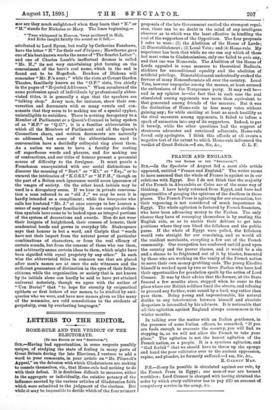LETTERS TO THE EDITOR.
HOME-RULE AND THE VERDICT OF THE ELECTORATE.
[To THE EDITOR OF THE " SPECTATOR."]
SIR,—Having had opportunities, in some respects possibly unique, of studying the state of feeling in many parts of Great Britain during the late Elections, I venture to add a word to your comments, in your article on "Mr. Plimsoll's Appeal," on the delusion with which Gladstonians are seeking to console themselves, viz., that Home-rule had nothing to do with their defeat. It is doubtless difficult to measure, either in the aggregate or individually, the relative potency of the influence exerted by the various articles of Gladstonian faith which were submitted to the judgment of the electors. But while it may be impossible to decide which of the four primary proposals of the late Government excited the strongest repul- sion, there can be no doubt in the mind of any intelligent observer as to which was the least effective in kindling the zeal of the supporters of the Opposition. The four proposals I refer to were : (1) the Abolition of the House of Lords; (2) Disestablishment ; (3) Local Veto ; and (4) Home-role. My experience has been that while no one can say which of these lost most votes to Gladstonianism, only one failed to gain any, and that one was Home-rule. The Abolition of the House of Lords appealed in some measure to theoretical Radicals, sticklers for unconditional equality and the abolition of artificial privilege. Disestablishment undoubtedly evoked the fervour of many Nonconformists all over the country. Local Veto, however unpopular among the masses, at least aroused the enthusiasm of the Temperance party. It may well be— and in my opinion is—the fact that in each case the zeal stimulated among opponents was more than equivalent to that generated among friends of the measure. Bat it was the distinction of Home-rule to lose many votes without gaining any ; for while exciting at least as much hostility as the rival measures among opponents, it failed to infuse a spark of animation into any of its supporters. Indeed, to put it tersely, while the other questions had the support of strenuous advocates and convinced adherents, Home-rule found only apologists. I think this affords at all events a negative test of the extent to which Home-role influenced the
verdict of Great Britain.—I am, Sir, Sce , C. L. F.


































 Previous page
Previous page